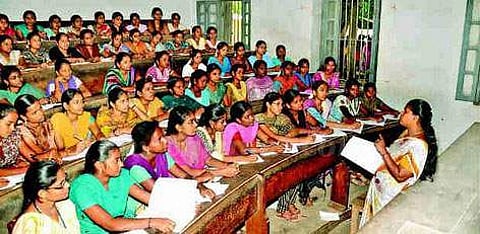

'College dropout' sounds awkward, doesn't it? Well, the Education Ministry of the Modi Government has changed how we looked at a college education. You can now leave college in any given year and will be awarded a certificate, diploma or degree depending on which year you leave.
An undergraduate degree will be of either three or four-year duration, with multiple exit options within this period, with appropriate certifications, said the ministry, as it announced the NEP. "The four-year programme may also lead to a degree 'with research'. A student can obtain a diploma after completing one year or an advanced diploma in a discipline or field (including vocational and professional areas) after completing two years of study or obtain a Bachelors degree after a three-year programme," read the NEP 2020 document. "The four-year Bachelor's programme with multi-disciplinary education, however, shall be the preferred option since it allows the opportunity to experience the full range of holistic and multi-disciplinary education with a focus on the chosen major and minors as per the choice of the student. For this purpose, there shall be an Academic Bank of Credit (ABC) which could digitally store the academic credits earned from various recognised HEIs so that the degrees from an HEI can be awarded taking into account credits earned," it added.
Adding academic credit points for each step would be a good incentive, said Deewanshi, a second-year student of Delhi University. "I think this is a great thing because with every step you will have academic credit points which can be used later and thus even as a drop out no amount of effort will go waste. Every step will be important and taken into consideration," she added.
On face value, 'multiple-exit options' seem to be a welcome innovation, said Suchintan Das, from St Stephen's College, but there are concerns that need attention. "However, it is not new. There was an option for completing a bachelor's degree without honours after the second year in the pre-CBCS annual system as well. What concerns me is the possibility of using 'multiple-exit option' as a euphemism for justifying drop-outs, especially for students from marginal communities and underprivileged backgrounds. Unless this is underwritten by a commitment of public funding (grants and not loans), this might just be used to prop up comforting statistics while hiding the ugly picture of college-dropouts in India," he said.
Dakrushi Sahu, a student of Labour studies in JNU said that this step might as well put students coming from marginalised backgrounds in a dilemma. "What and how qualitative skills a certificate holder or a diploma holder will possess that will make him/her employable is the question now. It will be a dilemma for students coming from the lower strata of society. It's also not clear what kinds of jobs will be available for them in the era of highly increased competition in the job market," he said. and added, "This system will increase the gender bais in a conservative society like India. Girls will be forced to go for a shorter duration of the course."
Pallavi Raj, a student from DU agreed with Dakrushi and added, "There are chances that the gender balance in the overall educational set up be altered disfavouring female students, as the parents who are already unwilling to send their female child to pursue higher education outside their residential state, would be satisfied by the so-called "one-year certification programme" bringing the female student back at home leading to discontinuation for further education of the females. Also, what purpose will a certificate of one year of diploma serve a student, he/she would not be able to be qualified even as a clerk. There is no substantive use of a one-year diploma course in subjects like that if liberal arts (political science, history, geography) unless the student has studied it for at least three or four years," she added.
Higher education institutes will also have the flexibility to offer different designs of Masters programmes — there may be a two-year programme with the second year devoted entirely to research for those who have completed the three-year Bachelors' programme; for students completing a four-year Bachelors programme with Research there could be a one-year Masters programme and there may be an integrated five-year Bachelor’s/Masters programme. "Undertaking a PhD shall require either a Master’s degree or a 4-year Bachelor’s degree with Research. The MPhil programme shall be discontinued," said the NEP 2020.
